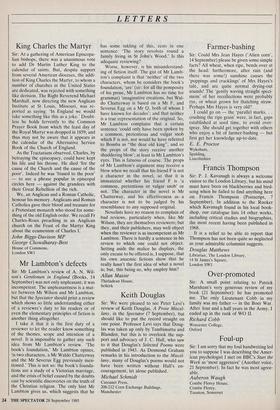Mr Lambton's defects
Sir: Mr Lambton's review of A. N. Wil- son's Gentlemen in England (Books, 14 September) was not only unpleasant; it was incompetent. The unpleasantness is a mat- ter between Mr Wilson and Mr Lambton, but that the Spectator should print a review which shows so little understanding either of a reviewer's duty to his readers or of even the elementary principles of fiction is another thing altogether.
I take it that it is the first duty of a reviewer to let the reader know something of the themes, scope and intention of a novel. It is impossible to gather any such idea from Mr Lambton's review. 'The book's foundation,' Mr Lambton opines, 'is two characters, a Mr Waldo Chatterway and the Mr Severus Egg previously men- tioned.' This is not so: the book's founda- tions are a study of a Victorian marriage, and the crisis of belief caused by the doubts cast by scientific discoveries on the truth of the Christian religion. The only hint Mr Lambton gives us, which suggests that he has some inkling of this, rests in one sentence: 'The story revolves round a family living in St John's Wood.' Is this adequate reviewing?
Worse, however, is his misunderstand- ing of fiction itself. The gist of Mr Lamb- ton's complaint is that 'neither' of the two characters, whom he considers the book's foundation, 'are' (sic: for all the pomposity of his prose, Mr Lambton has no time for grammar) 'imaginative creations, but Wal- do Chatterway is based on a Mr F, and Severus Egg on a Mr Q, both of whom I have known for decades'; and that neither is a true representation of the original. So, Mr Lambton complains that a certain sentence 'could only have been spoken by a common, pretentious and vulgar snob which F is not, nor would he have referred to Bomba as "the dear old king", and so the props of the story receive another shuddering blow'; at least in Mr Lambton's eyes. This is fatuous of course. The props of Mr Lambton's argument may receive a blow when we recall that his friend F is not a character in the novel, so that it is immaterial whether his friend F is 'a common, pretentious or vulgar snob' or not. The character in the novel is Mr Chatterway, and his effectiveness as• a character is not to be judged by his resemblance to any supposed original.
Novelists have no reason to complain of bad reviews, particularly when, like Mr Wilson, they are themselves reviewers; but they, and their publishers, may well object when the reviewer is as incompetent as Mr Lambton. There is hardly a sentence in his review to which one could not object. Setting aside the malice he displays, the only excuse to be offered is, I suppose, that his own anaemic fictions show that he really hasn't the first idea of what a novel is; but, this being so, why employ him?
Allan Massie
Thirladean House, Selkirk














































 Previous page
Previous page